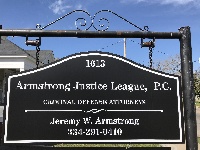Salem Felony Lawyer, Alabama
Not enough matches for Salem Felony lawyer.
Below are all Salem Criminal lawyers.
Benny Hand
✓ VERIFIEDCriminal, Divorce & Family Law, Accident & Injury, Business, Wills & Probate
Ben Hand is the founding partner of Hand Law Firm, LLC. as well as a partner in Hand & Hand Mediation, LLC. Ben was admitted to the Bar in Alabama in... (more)
Jeremy W. Armstrong
✓ VERIFIEDCriminal, Felony, Misdemeanor, DUI-DWI, State Appellate Practice
"A Criminal & D.U.I. Defense Law Firm"
I have spent my entire legal career in the criminal justice system as a former prosecutor and a criminal defense attorney since October 2000. In Apri... (more)
Barbara H. Agricola
Criminal, Divorce & Family Law, Accident & Injury, Employment
Status: In Good Standing
FREE CONSULTATION
CONTACTGabriel Joseph Smith
Education, Traffic, Criminal, Accident & Injury
Status: In Good Standing Licensed: 13 Years
FREE CONSULTATION
CONTACTMichael Clay Fellows
Construction, Nursing Home, White Collar Crime, Personal Injury
Status: In Good Standing



